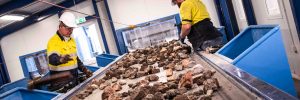Skip Bin Guide: Acceptable and Prohibited Waste
Understanding Waste Disposal: A Comprehensive Guide
When it comes to waste disposal, skip bins offer a convenient and efficient solution for both residential and commercial projects. However, it’s crucial to understand what types of waste are acceptable and prohibited to ensure safe and responsible disposal practices. In this guide, we’ll explore the various categories of waste and provide insights into what you can and cannot dispose of in a skip bin.
Acceptable Waste Materials
General Waste: This category includes household waste, such as paper, cardboard, plastics, and non-recyclable materials. General waste skip bins are suitable for disposing of everyday items that are not hazardous or prohibited.

Skip Bin Guide: Acceptable and Prohibited Waste
Green Waste: Garden waste, including grass clippings, branches, leaves, and other organic materials, can be disposed of in green waste skip bins. These materials are typically recycled into mulch or compost.
Construction and Demolition Waste: Skip bins are commonly used for construction and demolition projects to dispose of materials such as bricks, concrete, tiles, timber, and rubble. These materials can often be recycled or reused in other construction projects.
Mixed Heavy Waste: This category includes a combination of general waste and heavier materials like bricks, concrete, and soil. Mixed heavy waste skip bins are suitable for projects that generate a variety of waste types.
Clean Fill: Clean fill skip bins are specifically designed for soil, clay, sand, and other inert materials. These materials are often reused in landscaping or construction projects.
Prohibited Waste Materials
Hazardous Waste: Hazardous materials pose a significant risk to human health and the environment if not disposed of properly. Examples of hazardous waste include asbestos, chemicals, paints, solvents, oils, batteries, and fluorescent light bulbs. These materials require specialized disposal methods and should never be placed in skip bins.
Electronic Waste (E-Waste): Items such as computers, televisions, mobile phones, and other electronic devices contain hazardous components and valuable resources that need to be recycled responsibly. Many municipalities offer e-waste recycling programs or collection points for proper disposal. https://woodysskips.com.au/
Liquid Waste: Skip bins are not suitable for disposing of liquids, including paints, oils, chemicals, and other fluids. Liquid waste can leak from the bin and contaminate the environment, posing a risk to soil and water sources.
Medical Waste: Medical waste, including syringes, needles, bandages, and other biohazardous materials, must be disposed of according to strict regulations to prevent the spread of infectious diseases and protect public health.
Food Waste: Skip bins are not designed for disposing of food waste, as it can attract pests and produce foul odors. Composting or using organic waste collection services is a more suitable option for managing food scraps and leftovers.
Conclusion
In conclusion, understanding what types of waste are acceptable and prohibited for skip bin disposal is essential for promoting environmental sustainability and adhering to regulatory requirements. By following the guidelines outlined in this guide, you can ensure that your waste disposal practices are safe, responsible, and compliant with local regulations. Whether you’re tackling a home renovation project or managing waste from a commercial construction site, choosing the right skip bin and disposing of waste properly will help minimize environmental impact and contribute to a cleaner, healthier planet.
By adhering to these guidelines, you can make informed decisions about waste disposal and contribute to a cleaner, healthier environment. Remember to always check with your skip bin provider or local authorities if you’re unsure about what materials are acceptable for disposal.
